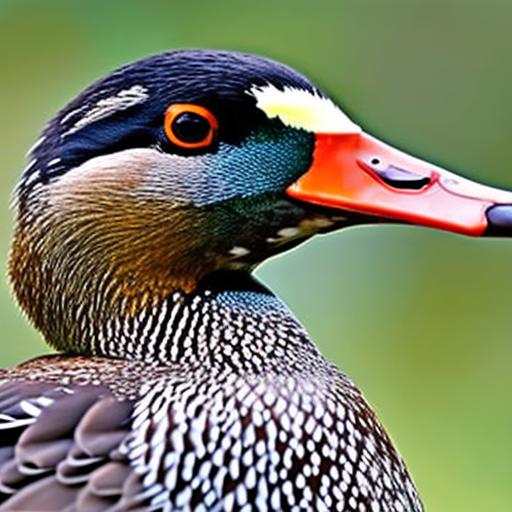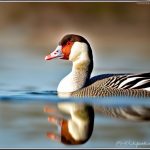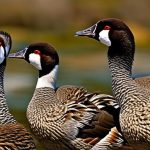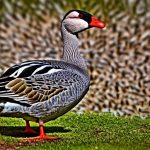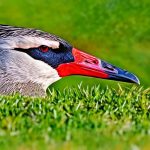Introduction:
Hello there! Are you tired of ducks and geese invading your yard? Well, you’re not alone. Many homeowners face the challenge of dealing with these feathered visitors. While they may seem harmless, ducks and geese can cause significant damage to your yard and property. In this article, we will explore the behavior of ducks and geese, identify the reasons why they visit your yard, evaluate the potential damage they can cause, and discuss effective strategies for keeping them out.
Understanding the behavior of ducks and geese:
Ducks and geese are fascinating creatures with unique habits and behaviors. They are attracted to areas with water sources, such as ponds, lakes, or even swimming pools. These water-loving birds also seek out areas with ample food supply, including grass, insects, and aquatic plants. Additionally, they are social animals that often travel in flocks.
Ducks and geese are known for their adaptability and intelligence. They can quickly learn patterns and routines, making it challenging to deter them once they have found a comfortable spot in your yard. They are also territorial creatures and will defend their chosen area from other birds.
Identifying the reasons for ducks and geese visiting your yard:
There are several common reasons why ducks and geese might be visiting your yard. One reason could be the presence of a water source, such as a pond or pool. Ducks and geese are attracted to water for bathing, drinking, and foraging purposes. If you have a water feature in your yard, it is likely to be a magnet for these birds.
Another reason could be the availability of food. Ducks and geese have a varied diet that includes grass, insects, seeds, and aquatic plants. If your yard has an abundance of these food sources, it may be attracting these feathered visitors.
It is essential to identify the specific reasons for ducks and geese visiting your yard to develop an effective plan for deterring them.
Evaluating the potential damage caused by ducks and geese:
While ducks and geese may seem harmless, they can cause significant damage to your yard and property. Their constant presence can lead to the destruction of grass, plants, and flowers. They also leave behind droppings that can be unsightly and pose health risks.
Moreover, their feeding habits can disrupt the ecosystem of your yard. Ducks and geese often uproot plants while foraging for food, which can lead to soil erosion and damage to the root systems of other plants.
Addressing the problem before it gets worse is crucial to prevent further damage and maintain the beauty of your yard.
Exploring humane ways to keep ducks and geese out of your yard:
When it comes to deterring ducks and geese from your yard, it is essential to use humane methods. These birds are protected by wildlife laws in many areas, so it is crucial to avoid causing harm or distress to them.
One effective method is to create physical barriers that prevent ducks and geese from accessing your yard. This can include installing fences or netting around water sources or using floating barriers on ponds. These barriers should be designed in a way that allows other wildlife, such as frogs or turtles, to access the water while keeping ducks and geese out.
Creating an uninviting environment for ducks and geese:
Another strategy is to make your yard less attractive to ducks and geese. This can be achieved by removing or reducing their food sources. Regularly mow your lawn to discourage the growth of tall grass, which is a favorite feeding ground for these birds. Additionally, remove any fallen fruits or seeds that may attract them.
You can also make your yard less appealing by using landscaping techniques that deter ducks and geese. For example, planting prickly or thorny shrubs around water sources can discourage them from landing or walking on those areas.
Using sound and visual deterrents to keep ducks and geese away:
Sound and visual deterrents can be effective in deterring ducks and geese from your yard. These methods work by creating an environment that is uncomfortable or frightening for the birds.
One option is to use noise-making devices, such as motion-activated sprinklers or ultrasonic devices that emit high-frequency sounds. These devices startle the birds and make them associate your yard with an unpleasant experience.
Visual deterrents, such as scarecrows, reflective tape, or predator decoys, can also be effective. These objects create the illusion of a predator presence, which scares away ducks and geese.
Seeking professional help for persistent duck and geese problems:
If you have tried various methods and are still struggling with persistent duck and geese problems, it may be time to seek professional help. Wildlife management professionals or pest control companies specialize in dealing with these types of issues. They can assess your situation, provide expert advice, and implement effective strategies to keep ducks and geese out of your yard.
In conclusion, dealing with ducks and geese in your yard can be a challenging task. However, by understanding their behavior, identifying the reasons for their visits, evaluating potential damage, and implementing effective strategies, you can successfully deter them in a humane manner. Remember to create physical barriers, make your yard less inviting, use sound and visual deterrents, and seek professional help if needed. With these strategies in place, you can enjoy a duck and goose-free yard while maintaining the beauty of your property.
If you’re tired of ducks and geese invading your yard, you’ll want to check out this informative article on Poultry Wizard. They provide valuable insights on how to keep these feathered intruders at bay. But that’s not all, Poultry Wizard also offers a wealth of knowledge on other poultry-related topics. For instance, if you’re wondering whether geese can eat chicken feed, they have an article dedicated to answering that very question. You can find it here: Can Geese Eat Chicken Feed? Additionally, if you’re considering raising chickens for your family, they have an article that guides you on determining the ideal number of chickens for a family of four: How Many Chickens Do You Need for a Family of 4? And if you’re looking for tips on portability when it comes to chicken coops, Poultry Wizard has got you covered with their article on chicken coop portage: Chicken Coop Portage. With Poultry Wizard’s comprehensive resources, you’ll be well-equipped to tackle any poultry-related challenges.
FAQs
What are some common reasons why ducks and geese enter yards?
Ducks and geese may enter yards in search of food, water, or shelter. They may also be attracted to ponds or other bodies of water in the yard.
What are some effective ways to keep ducks and geese out of your yard?
Some effective ways to keep ducks and geese out of your yard include installing fencing, using decoys or scare devices, removing sources of food and water, and planting vegetation that is unappealing to them.
What types of fencing are effective for keeping ducks and geese out of yards?
Fencing that is at least 3 feet tall and has small openings or mesh is effective for keeping ducks and geese out of yards. Electric fencing can also be effective.
What are some examples of scare devices that can be used to keep ducks and geese out of yards?
Examples of scare devices that can be used to keep ducks and geese out of yards include motion-activated sprinklers, reflective tape or balloons, and predator decoys.
Why is it important to remove sources of food and water to keep ducks and geese out of yards?
Removing sources of food and water is important because ducks and geese are attracted to these resources. If they cannot find food or water in a yard, they are less likely to enter it.
What types of vegetation are unappealing to ducks and geese?
Vegetation that is unappealing to ducks and geese includes plants with prickly leaves or stems, such as holly or rose bushes. Plants that are toxic to birds, such as daffodils or rhubarb, should be avoided.
Meet Walter, the feathered-friend fanatic of Florida! Nestled in the sunshine state, Walter struts through life with his feathered companions, clucking his way to happiness. With a coop that’s fancier than a five-star hotel, he’s the Don Juan of the chicken world. When he’s not teaching his hens to do the cha-cha, you’ll find him in a heated debate with his prized rooster, Sir Clucks-a-Lot. Walter’s poultry passion is no yolk; he’s the sunny-side-up guy you never knew you needed in your flock of friends!

